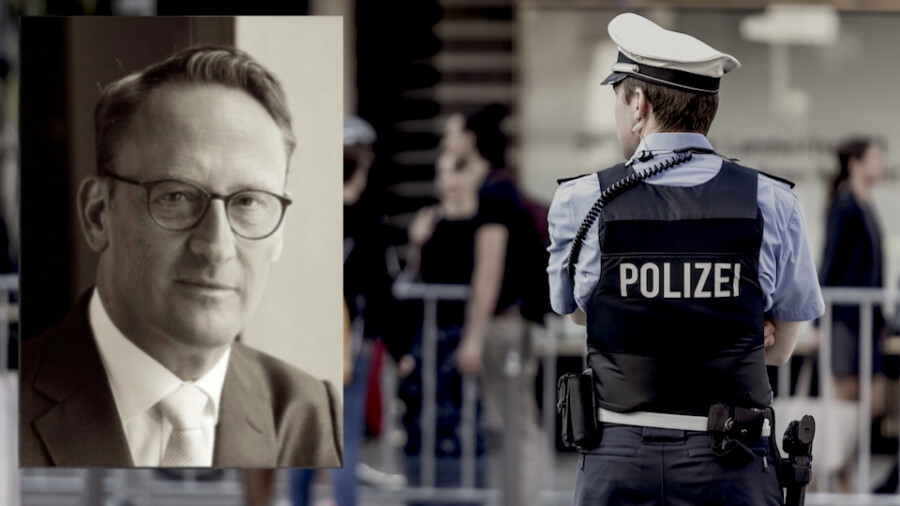
BERLIN — German police continue implementing an intimidation plan targeting specific Twitter users who post or retweet any explicit content, in an attempt to move forward with local bureaucrat Tobias Schmid’s campaign to purge all open platforms of adult content.
Germany’s leading news magazine, Der Spiegel, today devoted an entire feature to the authorities’ campaign to deter users from sharing sexual content, highlighting the threats of legal action already reported recently by individual users and Wired magazine.
A more in-depth report last week by NetzPolitik’s Sebastian Meineck — who has been covering Schmid’s meticulous, obsessive attempts to ban all sexual content from open platforms in Germany and Europe — pointed out that authorities already took down “around 150 accounts for distribution of pornography,” over tweets and retweets.
Meineck identified a ramping up since December, with authorities using threats from German police units to confront adult performers, creators and other sex workers over explicit videos and images they tweeted or promoted.
This recent outgrowth of Schmid’s campaign is one of the most prominent examples of efforts by anti-porn crusaders around the world to censor sexual expression in open platforms such as Twitter, Reddit, Discord and Telegram.
Censorship and Arbitrary Enforcement
Paulita Pappel, German porn producer and spokeswoman for the Free Speech Coalition Europe, told NetzPolitik that the tactics of police intimidation constituted outright censorship.
“We are treated like criminals,” she said.
The authorities are leaning on their discretionary enforcement of German’s censorship clause, Penal Code Section 184, stating that “anyone who makes available pornographic content in a place that can be viewed by persons under the age of eighteen shall be punished with imprisonment for not more than one year or a fine.”
Germany and Europe have no legal tradition of absolute free speech protection akin to the U.S. First Amendment.
As XBIZ has been reporting, the current activation of censorship enforcement of expression via Twitter was directly prompted by a strategy devised by Tobias Schmid, director of the State Media Authority of North Rhine-Westphalia. Waging his one-man War on Porn, Schmid — an obscure conservative politician who has been described as having “a fetish for order.”
Schmid’s efforts resulted in the creation of KIVI surveillance software, which he has been attempting to expand to all of Europe. KIVI automatically scans all online content to determine which images are not compliant with the law.
Last year, Schmid held a press conference boasting of the effectiveness of his technology for monitoring the content of his fellow Germans and Europeans. He proudly explained that he coined the name KIVI after “KI” — the German initials for AI — and “VI” from the Latin word “vigilare,” meaning “to survey.”
The Brandenburg-Berlin Media Authority, who handled the 150 cases made public since December told NetzPolitik that “the KIVI AI tool was not used to process the cases mentioned.” Each case, they claimed, was handled by a human bureaucrat.
One of Schmid’s reps at the North Rhine-Westphalia Media Authority told Wired last month that “the distribution of pornography on the internet is only permitted in closed user groups with prior age verification. Since this is not the case on Twitter, the distribution of pornography via Twitter in its current form is not permitted in Germany.”
Anneke Plass, the communications director and spokesperson for the Media Authority of Berlin and Brandenburg, told Wired that in December, that bureau reported 32 accounts to the public prosecutor’s office for sharing pornography, followed by another 104 cases in March.
According to Plass, “providers” — her term for creators — of adult content “are responsible for making sure that children and young people cannot access the content.”
If providers do not meet these requirements, Plass added, “they are by law punishable by imprisonment up to one year or by a fine.”
“These actions create an atmosphere of fear and politically and financially strangle the industry,” Paulita Pappel told NetzPolitik, which noted that “people are surprised about this abroad — after all, Germany is considered liberal, since sex work is legal here under certain conditions.”
German Bureaucrats Fighting ‘Bizarre Sexual Practices’
Definitions used by the authorities, for example those differentiating “eroticism” (protected as free speech) from “pornography” (subject to censorship), can be nebulous an arbitrary.
NetzPolitik quoted literature from the Commission for the Protection of Young Persons in the Media (KJM), an organ of the German media supervisory authority. The document has references to undefined “problematic behavior” by minors, and singles out for criminal action what it deems as “aggressive sexual acts, bizarre sexual practices, use of aids [devices] and group sex.”
“What exactly is meant by “bizarre” is not stated there,” writes NetzPolitik’s Meineck. “Not even which ‘aids’ are supposedly taboo.” This creates the peculiar situation in the country where minors are allowed to legally buy sex toys but according to the regulator, “are obviously not always allowed to see how they are used.”
Queried about these contradictions, one of the government officials told NetzPolitik that “the difference between eroticism and pornography is always checked on a case-by-case basis, as a spokeswoman explains.”
Consulted by NetzPolitik, sex worker and advocate Fabienne Freymadl criticized the document’s negative references to “promiscuity and prostitution,” calling the standards used by authorities “vague, opaque and difficult to understand, and sex and sex work hostile.”
“It’s time for us to enter the 21st century,” Freymadl added. “Neither an active sex life with several changing partners nor the practice of sex work are in any way morally reprehensible.”
Main Image: Tobias Schmid, director of the State Media Authority of North Rhine-Westphalia
